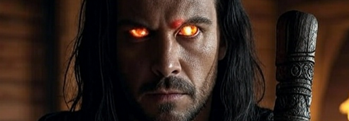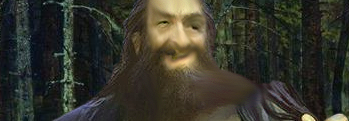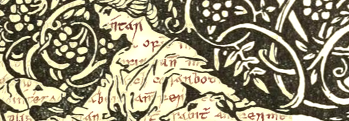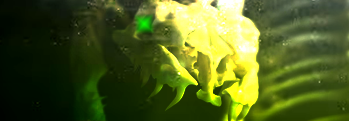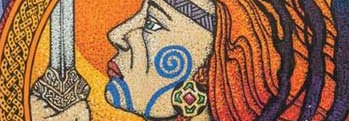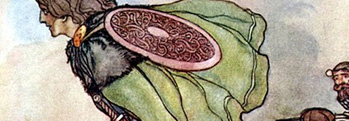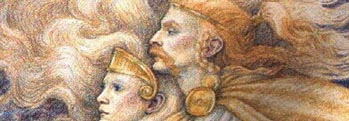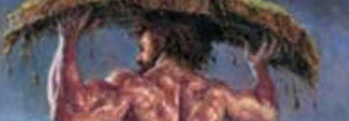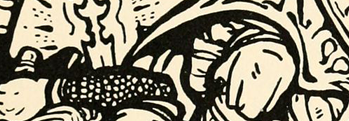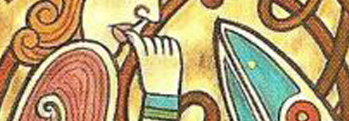The Flight of Fionn
Irish and Celtic myths and legends, Irish folklore and Irish fairy tales from the Fenian Cycle
A King doomed by prophecy seeks to escape his fate
 There was a mighty warrior in the west of Eriu, and Cumhal Mac Art was his name. Feared was his axe and he could skewer two men with a single cast of his feathered war-dart, and yet for all that he lived a lonely life, and a life of fear – for it had been foretold that should he ever marry, he would die in battle the very next day!
There was a mighty warrior in the west of Eriu, and Cumhal Mac Art was his name. Feared was his axe and he could skewer two men with a single cast of his feathered war-dart, and yet for all that he lived a lonely life, and a life of fear – for it had been foretold that should he ever marry, he would die in battle the very next day!
But all of his fears fell from him when he laid eyes on the daughter of the king through a window, a princess whose beauty hearkened back to the old people of Ireland, ethereal and earthy at the one time.
Unknown to Cumhal, the Druids had whispered in the king's ear that should his daughter ever bear a son, that child would take the kingdom from him, so the king kept her secluded in his high tower, letting no man come near her.
But this didn't dissuade Cumhal – he gave his heart to her and they were married in secret, even after she spoke to him of the prophecy, and when he strode forth the next morning, sure enough he learned there was a battle to be fought!
Knowing then his end was upon him, he went to his mother and confessed everything, including his secret marriage, and spoke of his fears that the king might murder any child he had given the princess, for fear of losing his kingdom.
"If the king's daughter has a son, I ask that you take him and hide him, raise him as your own, for you will be his only hope and protection!" he begged her.
His mother agreed and as foretold, Cumhal died that very day in battle. Less than a year later, the princess had a son, and the king ordered him thrown from her high tower into the lake below on the very day of his birth.
Out the window he flew to the despairing wails of his mother, and he sank into the deep waters of the loch with hardly a splash – but after a little while he rose again and was pulled to the shore by keeping a grip on live salmon, one in either hand!
Cumhal's mother, the boy's grandmother, was watching on the shore hoping for a chance to help in some way, and when she saw this, she knew the infant to be her grandson, the true son of her son. Taking the boy she fled into the forest before any could stop her.
And she had been seen by watchers on the walls, and when the king heard the infant had escaped, he flew into a ferocious rage, sending out hunters to slay any child that might be his grandson!
But the boy's grandmother was a crafty woman, and she made her way quickly into the deep and dark forest. She found a man and paid him to cut a chamber in a mighty oak tree, big enough for herself and the boy and a puppy they had found, with a little door that looked like nothing so much as part of the tree itself.
After the man was done, she asked him for his axe, and quick as you like, she cut his head clean off his shoulders!
"Now you will tell nobody about this place" she said, as she buried the body.
The puppy ate some of the chippings, or bran, left by the woodsman's work, and so he was called Bran from that day forward.
The three of them lived in that tree for a full five years, and the boy was not let out for all of that time, so that he couldn't walk on the day she finally opened the door for him, so long had he been sitting.
His grandmother brought him to the top of a long, sloping hill and taking a stick, and said
"Take a run down this hill, I'll come after you and slap you with the stick. On the way back up, you chase me and do the same."
At first he was hit many times, and struck her not at all, but as the day went on he began to avoid being struck more often, and in turn struck her more. For three days they kept this up, and by the end of it she couldn't touch him, but couldn't escape his stick! He was now a fleet-footed runner.
Some years later, the old woman, the dog and the boy travelled to the Tailteann games, to a hurling match being held between his grandfather's men and the warriors of a nearby kingdom. The two sides were equal in skill and neither was able to get the upper hand, until the boy joined the team opposing his grandfather.
He won every game, never letting the ball touch the ground, dancing around the other players until he had scored. Well the king, who was by now older and if anything fiercer, roared in anger and demanded to know who the newcomer was.
"Who is that Fionn Cumhal?" he shouted, asking who was the white-cap, referring to the boy's blond hair.
With that his grandmother's eyes lit up and she nodded, knowing that for his true name, Fionn Mac Cumhaill!
The king had enough of humiliation and told his men to seize and slay the boy, not having mellowed with age in the least, but Fionn, Bran and his grandmother slipped into the crowds and made good their escape. By now the three were fleet enough to cover a hill at a leap, a glen at a step, and a dozen miles in one bound! Fionn grew tired after a time, so the old woman put him on her back and continued just as quickly as before.
They heard nonethless the sounds of pursuit, for the king had told the Druids to summon forth Sidhe riders from the mounds, so she asked Fionn what was coming after them.
"It is a white horse, with a poweful warrior on his back!" replied Fionn.
"Nothing to fear there," said she, "for a white horse has no wind and he can't catch us - we are safe from that rider." But again she felt someone draw near and again she asked Fionn what was coming up behind them.
"I see a brown horse," cried Fionn, "and a splendid champion astride him!"
"All is well," she said, reassured, "a brown horse will soon get bored and giddy, we cannot be caught by the likes of that!" But a third time she heard pursuit and again she asked him who followed.
"A dark warrior on a black horse," replied Fionn, and she frowned, for she knew they were undone.
"There is no horse that can run like a black horse," said she, "strong is its wind and long its gait – one or both of us must die this day, for we will not escape! It will be me, for I am old and my time is almost done, you and Bran save yourselves."
They came to a deep bog and Fionn and Bran hopped off her back. She told them to flee with all haste into the wetlands where they would leave no track, and threw herself into the deepest part of the bog, where she sank to her neck.
"I will tell the king's men that you fell into the bog ahead of me and sank out of sight, since your hair and mine are the same colour in any case, the king will be satisfied with my head."
Fionn fled with Bran, thanking his grandmother, and before too long the black clad warrior caught up with her.
"Where is Fionn?" he asked, and she told him that he had slipped into the bog ahead of her, and she wept.
As she predicted they searched for Fionn but could find no sign of him, and so they cut her head from her shoulders, agreeing that since her hair was the same colour as Fionn's it would do to satisfy the king's anger, while Fionn and Bran made good their escape.
The site of the old Tailteann games can be found on the map below!
More Legends from the Fenian Cycle
Mongán mac Fíachnai was a prince of the Gaels, none other than he whose father was Fíachnae mac Báetáin, and it was about the seventh century in Ireland when he ruled over Ulster. Many are the tales told of him and his royal reign, with some even whispering that he was the son of Manannán mac Lir, ancient G ... [more]
The Corleck stone head is believed to be an ancient pagan idol, representing perhaps some ancestor or deity from the pre-Christian era in Ireland. The most striking aspect of the Corleck stone head is its three faces, set in strange, almost unsettling expressions, all the more remarkable for their simplicity of design, lacking ears or detailed feat ... [more]
The Clonoura shield was discovered standing upright in a bog in Clonoura, county Tipperary and represents one of the very few fully intact Iron Age shields that have ever been found. It is marked with many slash and stab scars from knives, swords, spears and other sharp weapons, and dates from 30 to 60 AD, pre-Christian Iron Age Ireland. It is q ... [more]
The days of the heroes of the Fianna have captured the imaginations of many throughout the ages, and one such was the ninth century poet Gofraidh Fionn O’Dalaigh, one of the finest poets in all of Killarney and all of Ireland. For it was his pen and none other that first put quill and ink to parchment and recorded the old story of Reicne F ... [more]
It was a fine day in Ireland many years ago when Fionn and his Fianna took a fancy to go out hunting. Warm was the sun amid the whispering glades of ancient forests, gentle was the breeze and sweet the scent of summer flowers in its bosom. Sweeter yet was the sight of a mighty deer to the eyes of the hunters, and so they gave chase, howling with de ... [more]
It was in the days of Fionn and the Fianna, a very long time ago in Ireland, that the people of Ben Edair decided to hold a festival, a Feis or Aonach, to celebrate the season. All of Fionn’s hosts were gathered, the seven ordinary warbands and the seven extraordinary warbands, and they danced and played music merrily with the people. Then ... [more]
There are few these days who have not heard of Fionn Mac Cumhaill, hero and defender of Ireland, or at least might recognise his name. But there were no creatures that Fionn loved amongst his three hundred dogs more than his two favourites, Bran and Sceolan, meaning Raven and Survivor, and though it’s a stranger story than most, this is the t ... [more]
It is not unusual for stories in the Irish legendarium to have more than one meaning besides that of a literal recounting of historical events, whether by accident or by design. Some tales were meant to be understood in the context of the era and culture of the story teller, while others might instruct in certain arts, and yet others contain myster ... [more]
Those monks who recorded the mythologies and folklore of Ireland which had previously been passed down by word of mouth from bard to druid to bard for countless generations were, by their very nature, devout Christians. As Christians they were dedicated to not only God and His Church, but to the people who bore and nurtured them, and everywhere the ... [more]
One day Fionn Mac Cumhaill, doughty hero of Ireland, and his friends Goll, Cialta and Oscar, as well as others of the Fianna, were resting after the hunt on a certain long hill now known by a different name. Their meal was being made ready, when what should happen only a girl of the kin of the giants came striding up and sat down among them, a grea ... [more]
Something which often appears in the most ancient tales of Ireland is the grisly vision of heads which speak after being separated from their bodies! This was said to be an art of the druids inherited from the necromancy of the Dé Danann, who were themselves said to be able to raise a whole army from the grave to fight again day after day! ... [more]
There once was a young fellow called Conall, and he lived with his parents in the east of the country. They lived a quiet life, catching fish and digging up oysters for meat and lamps, but one dark day the Fomors came and demanded tribute. Having none to give, his father bid the sea demons begone, but instead they made to take himself and his famil ... [more]
Young Fionn Mac Cumhaill was out walking with his dog Bran one fine morning, and he happened to pass into a deep and thick dark wood of the kind that once covered all of Ireland, for the hunting was better there, when what did he come across but a thousand horses hauling timber and men chopping down the trees and preparing the logs. "What a ... [more]
There was a mighty warrior in the west of Eriu, and Cumhal Mac Art was his name. Feared was his axe and he could skewer two men with a single cast of his feathered war-dart, and yet for all that he lived a lonely life, and a life of fear – for it had been foretold that should he ever marry, he would die in battle the very next day! But all ... [more]
It was in the day of Fionn Mac Cumhaill when he was an old man, yet still hale and hearty, that one of his warriors, whose name was Diarmaid son of Donn and grandson of Duibne, had carried off his young bride-to-be, Gráinne daughter of Cormac! The two had fallen in love and Gráinne, for all of Fionn's fame, wanted nothing to do wi ... [more]
One warm summer's day Fionn and his men were out hunting through the darkling forests of Ballachgowan in Munster, chasing deer and boar through the gloomy glades, when they stopped short all of a sudden and came face to face with a startling sight! For what had stepped between them and their prey but a strange, damp giant of a man. Black wer ... [more]
Fionn Mac Cumhaill stood at the door of his hunting lodge with his fists on his hips, his heart sinking as he realised his intentions to hunt for deer this day were lost in the waves of mist and fog that had rolled in from Dublin bay, although at that time it was known by a different name. It had come as far inland as Gleann na Smol, the Glen of th ... [more]
When Fionn Mac Cumhaill became leader of the Fianna, the fiercest and most warlike of those bands of heroes who lived in the wild places, hunting and acting as champions for their kings, and defending Ireland from evil, he decided that he wished to have only the best warriors to follow him. So he sat down and sucked his thumb to taste the wisdom ... [more]
Close by where Limerick city stands today lie the ruins of an ancient and once mighty fortress called Carrigogunnel, which commanded all the lands about with a stern hand. It was known then as a place of ill omen, and it is known today as the same, for it was once the home of an uncanny hag by the name of Gráinne. Amid the surrounding mar ... [more]
A dark horde of fell-handed warriors approached Ireland, sails gathered off the coast like storm clouds, billowing out in the gusts of uncertain wind, while oars bent to the rolling thunder of drums. Fierce indeed was the host of King Colgan, master of Lochlainn, and he came to make war on Cormac Mac Airt, High King of Ireland! As soon as Fionn ... [more]
Diarmuid the Fair, son of Donn or Duibhne of the Tuatha De Danann was one of the Fianna, the great warriors of ancient Ireland who protected the land from dangers near and far. It was said that no woman could resist his gaze, for he'd been granted the blessing of comeliness by the Ghost Queen Morrigan after he helped her out of a spot of bother ... [more]
Fionn Mac Cumhaill and the rest of the Fianna were resting after a great battle, weary and sore with sorrow at the loss of their fellows, when they spied coming along the shores of Loch Lein in County Kerry a beautiful young woman riding a swift horse, so swift indeed that its hooves scarcely seemed to touch the ground! Now although the women of ... [more]
Now it is known by some that the fairies of Ireland weren't much like the fairies we hear about in these latter days, harmless things of mischief and frolic, but were instead respected and often feared, for their anger was quick and their kindness was whimsical. Some would join men in battle, and some would make war on men, others were omens of ... [more]
It was a fine brisk spring morning in Ireland when Fionn Mac Cumhaill decided to take himself for a stroll along the white sandy beaches of the seashore, the better to breathe the air and enjoy the simple pleasures life had to offer. But that morning, life had more to offer and it didn't look pleasant, for it was a giant bearing down on the bea ... [more]
Fionn MacCumhaill was well known as a fair and handsome man, but his most distinguishing feature was his grey hair - and he was not born with it! Fionn was one time out on the green of Almhuin, and he saw what had the appearance of a grey fawn running across the plain. He called and whistled to his hounds then, but neither hound nor man heard hi ... [more]
After his seven years of training with the poet Finegas were done, Fionn Mac Cumhaill took himself from the river Boyne to the great hall of the High King in Tara, Conn of the Hundred Battles, to present himself there as a member of the Fianna, the very best of the best warriors throughout Ireland. Announcing himself, Conn took him into the band an ... [more]
Here is the story of how Fionn MacCumhaill gained the knowledge of the world. And wouldn't it be a great thing to know it all? Still, knowledge and wisdom must be balanced, and this was known to the young man called Fionn, which means fair and bright. He was fleeing from the warriors who had murdered his father when he came upon the hiding plac ... [more]




